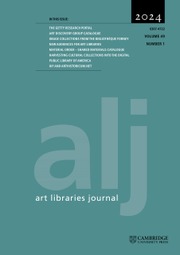Article contents
Art + Feminism: an interview with Siân Evans
Published online by Cambridge University Press: 15 April 2019
Extract
How to answer this question? I guess I began my career as a librarian at a party. Newly possessing what I already knew was a useless (in capitalist terms, at least) MA in Art History, I had moved to New York City to be closer to my family, and to stay up all night at MisShapes parties and eat pizza at dawn. I was working in marketing for Forbes Magazine, as you do when you're 24 and need to pay the bills and have no idea what you want to do with your life. It wasn't long after the financial collapse of 2008, when job prospects were very low, that a friend of a friend who had just finished library school at Pratt handed me a drink at a party and said, ‘you like writing and researching, if you don't want to be a teacher, why don't you become a librarian?’
- Type
- Research Article
- Information
- Art Libraries Journal , Volume 44 , Special Issue 2: Critical Art Librarianship , April 2019 , pp. 72 - 77
- Copyright
- © ARLIS, 2019
References
1. Kara Jesella, “A Hipper Crowd of Shushers”, New York Times, July 8, 2007, https://www.nytimes.com/2007/07/08/fashion/08librarian.html
2. Noam Cohen, “Define Gender Gap? Look Up Wikipedia's Contributor List”, New York Times, Jan. 30. 2011, http://libguides.mica.edu/prf.php?account_id=91499
3. “Computational Linguistics Reveals How Wikipedia Articles Are Biased Against Women”, MIT Technology Review, https://www.technologyreview.com/s/534616/computational-linguistics-reveals-how-wikipedia-articles-are-biased-against-women/
4. Amanda Filippacchi, “Wikipedia's Sexism Toward Female Novelists”, New York Times, April 24, 2013, https://www.nytimes.com/2013/04/28/opinion/sunday/wikipedias-sexism-toward-female-novelists.html
5. “Outcomes”, Art + Feminism, https://en.wikipedia.org/wiki/Wikipedia:Meetup/ArtAndFeminism/Outcomes
6. “Final Report 2017/18”, Art + Feminism User Group, https://meta.wikimedia.org/wiki/Art%2BFeminism_User_Group/Reporting/FinalReport2017-2018#Metrics
7. Astra Taylor, “Open systems or glass ceilings”, Guernica, April 11, 2014, https://www.guernicamag.com/astra-taylor-open-systems-and-glass-ceilings/
8. Michael Mandiberg, “The Affective Labor of Wikipedia: GamerGate, Harassment, and Peer Production”, Social Text Online, https://socialtextjournal.org/affective-labor-of-wikipedia-gamergate/
9. “Art + Feminism: Careful with Each Other, Dangerous Together”, https://www.youtube.com/watch?v=KHcd1lfZ4ws
10. Bryce Pearce, “WP:THREATENING2MEN: Misogynist Infopolitics and the Hegemony of the Asshole Consensus on English Wikipedia”, Ada: A journal of gender, new media & technology, n.7, https://adanewmedia.org/2015/04/issue7-peake/
11. Brown, Jennifer et al. , “We Here: Speaking Our Truth,” Library Trends 67, no. 1 (October 25, 2018): 163–81CrossRefGoogle Scholar, https://doi.org/10.1353/lib.2018.0031
12. Jennifer A. Ferretti, “Neutrality is Hostility: The Impact of (False) Neutrality in Academic Librarianship”, Medium, https://medium.com/librarieswehere/neutrality-is-hostility-the-impact-of-false-neutrality-in-academic-librarianship-c0755879fb09
13. Siân Evans, “Neutrality is an Oppressive Myth, or: Teaching Freshmen About Neutrality and Knowledge”, Medium, https://medium.com/@sinevans/neutrality-is-an-oppressive-myth-or-teaching-freshmen-about-neutrality-and-knowledge-9e8d92d6c0c3
14. Lisl Walsh, “Academia is Irreparably Ableist”, Medium, https://medium.com/@lislanna/academia-is-irreparably-ableist-925fb33721ff
- 1
- Cited by




